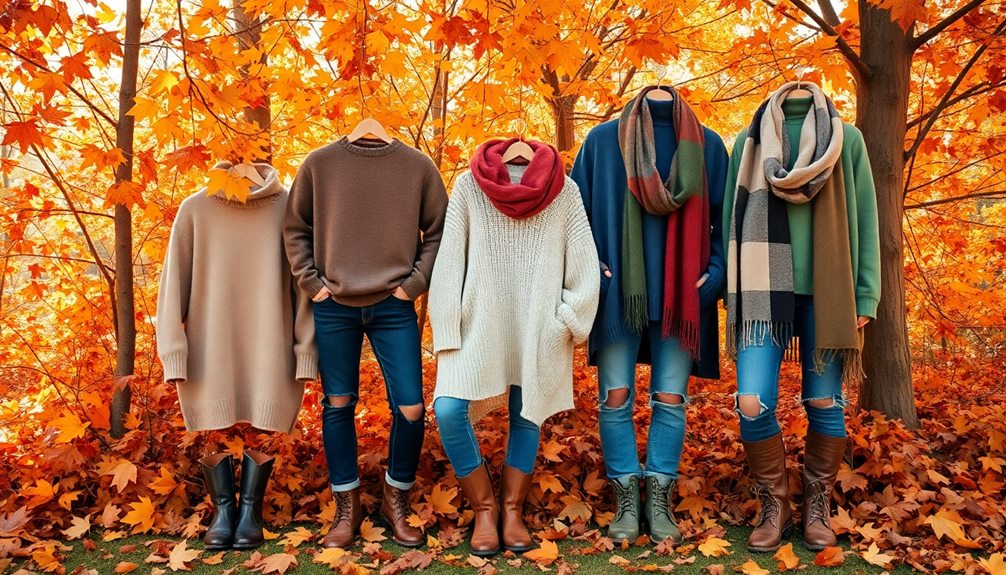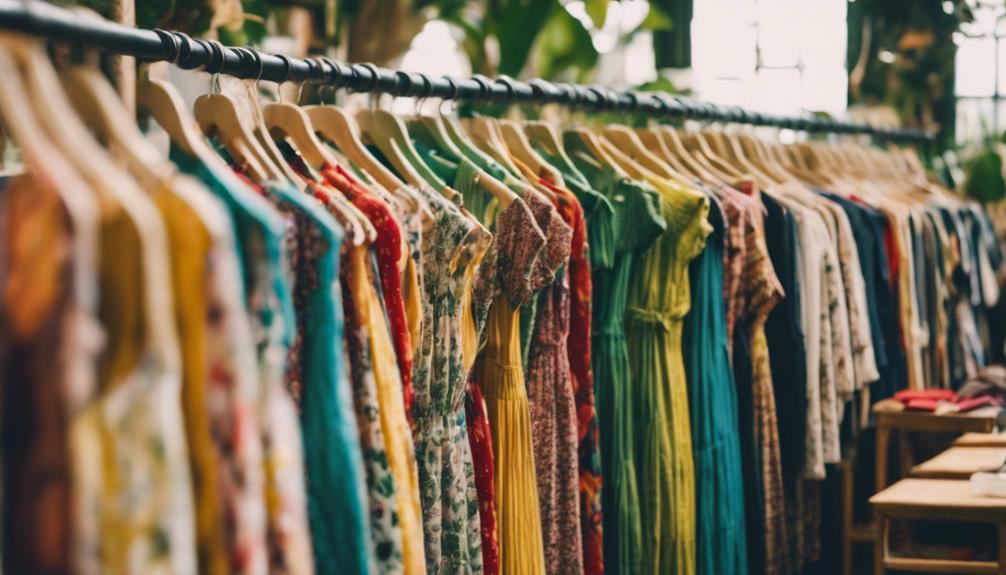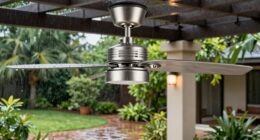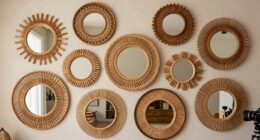To build a sustainable fall wardrobe, focus on eco-friendly brands like Tentree, Pact, and Everlane. Tentree plants a tree for every item sold, while Pact offers Fair Trade certified organic cotton. Everlane emphasizes ethical factories and recycled materials. Look for cozy sweaters, layering jackets, and sustainable denim in earthy tones for easy mixing and matching. Incorporate functional accessories like oversized totes and ethically made boots to complete your look. Choosing these timeless pieces not only enhances your style but also makes a positive impact on the planet. Want to know more tips for eco-friendly fashion choices?
Key Takeaways
- Sustainable fashion significantly reduces carbon emissions by utilizing eco-friendly materials and ethical production practices, promoting a healthier planet.
- Key fall wardrobe essentials include cozy sweaters, layering jackets, sustainable denim, practical accessories, and ethically made footwear.
- Explore top eco-friendly brands like Tentree, Pact, Everlane, People Tree, and Outerknown for sustainable fashion choices.
- Focus on timeless pieces and classic styles to build a capsule wardrobe that emphasizes quality, versatility, and personal style.
- Choose fabrics like organic cotton, recycled polyester, and Tencel to ensure your wardrobe is both stylish and environmentally friendly.
The Importance of Sustainable Fashion
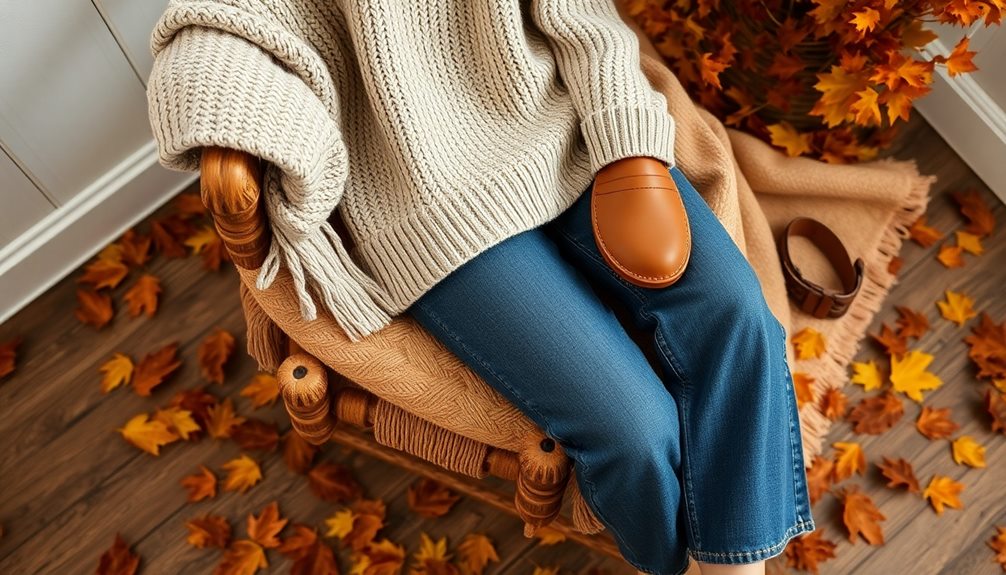
In recent years, the importance of sustainable fashion has become more evident as the fashion industry continues to contribute considerably to global carbon emissions.
With fast fashion's role in pollution and overconsumption, many consumers like you're seeking eco-friendly alternatives. Sustainable fashion prioritizes using organic materials, recycled materials, and low-impact textiles, which not only reduce reliance on non-renewable resources but also lower the carbon footprint of clothing production.
By choosing ethical clothing brands, you're supporting ethical practices that guarantee fair labor standards and living wages for workers.
These brands often embrace slow fashion principles, focusing on quality over quantity and promoting longevity in your wardrobe. This approach not only enhances your style but also reduces the environmental impact of discarded clothing.
Moreover, sustainable fashion supports a circular economy, encouraging initiatives that minimize waste and promote recycling.
By opting for fair trade clothing, you play a role in a more responsible production cycle, ultimately leading to a healthier planet.
Key Features of Capsule Wardrobes
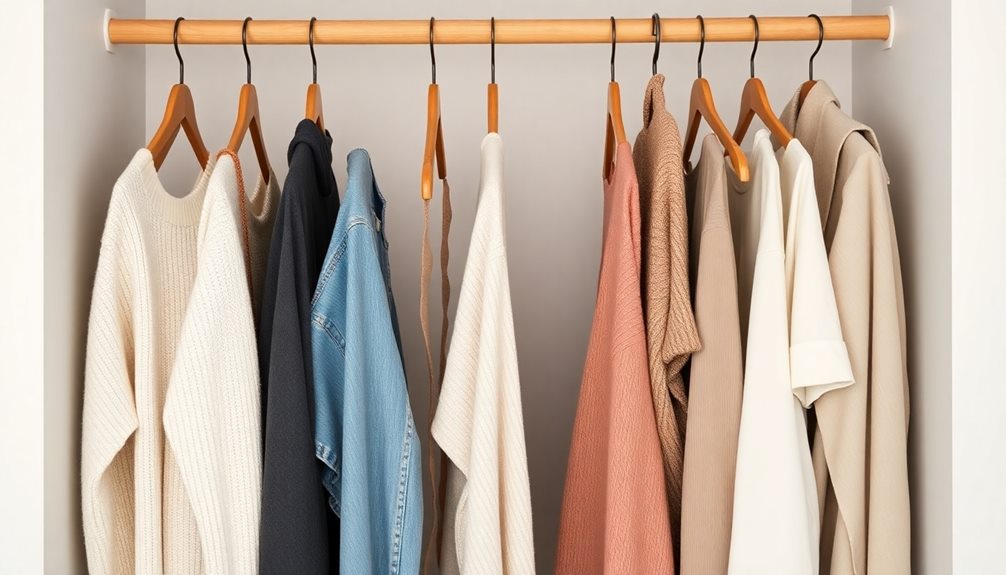
A capsule wardrobe can transform your approach to fashion by simplifying your choices and maximizing versatility. By focusing on a limited selection of curated clothing items, you can create countless versatile outfits while reducing clutter in your closet.
Here are some key features to take into account:
- Timeless Pieces: Capsule wardrobes center around classic styles that never go out of fashion, allowing for longevity in your wardrobe.
- Sustainable Fabrics: Many sustainable fashion brands prioritize materials that are eco-friendly, supporting your commitment to mindful consumption.
- Ethical Manufacturing: Building your capsule wardrobe means choosing brands with transparent supply chains and ethical practices, ensuring responsible fashion choices.
- Time Savings: With just 12 curated clothing items, you'll save up to 15 minutes daily on outfit selection—nearly 100 hours each year!
This simplicity not only streamlines your decision-making process but also empowers you to express your personal style while aligning with sustainable values.
Top Eco-Friendly Brands to Explore
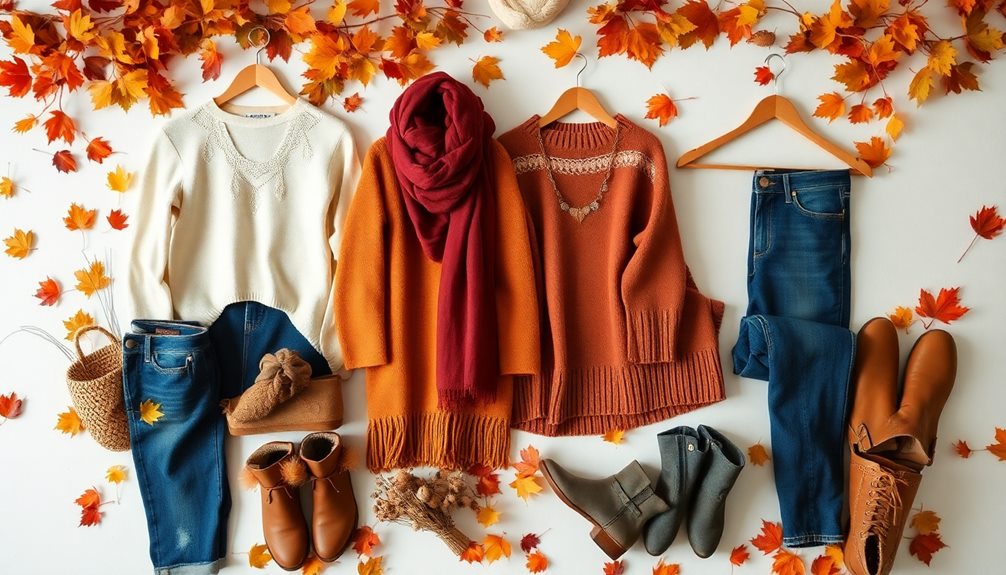
Building a sustainable wardrobe goes hand in hand with choosing the right brands. Consider Tentree, which plants a tree for every item sold, boasting over 100 million trees planted. Their clothing features organic cotton and Tencel, ensuring you support the environment while looking great.
Pact stands out with its Fair Trade Certified and GOTS certified organic cotton products, utilizing carbon-offset shipping and biodegradable packaging. It's a fantastic option for those who value ethical practices in fashion.
If transparency speaks to you, check out Everlane. They focus on ethical factories and use recycled materials to create timeless, sustainable clothing.
For a true pioneer in sustainable fashion, search no more than People Tree. They prioritize GOTS certified organic cotton and fair trade production methods, offering eco-friendly options that give back to communities.
Lastly, Outerknown, co-founded by surfer Kelly Slater, emphasizes organic and recycled materials while advocating for fair labor practices.
Each of these brands not only champions sustainable fashion but also provides responsibly made options that fit perfectly into your eco-conscious wardrobe. These best sustainable fashion brands prioritize ethical sourcing, environmentally friendly materials, and fair labor practices, ensuring that every piece is as kind to the planet as it is stylish. By investing in their collections, you actively support a more mindful and transparent fashion industry. Together, these choices pave the way toward a more sustainable and responsible future for fashion lovers everywhere.
Essential Fall Wardrobe Pieces
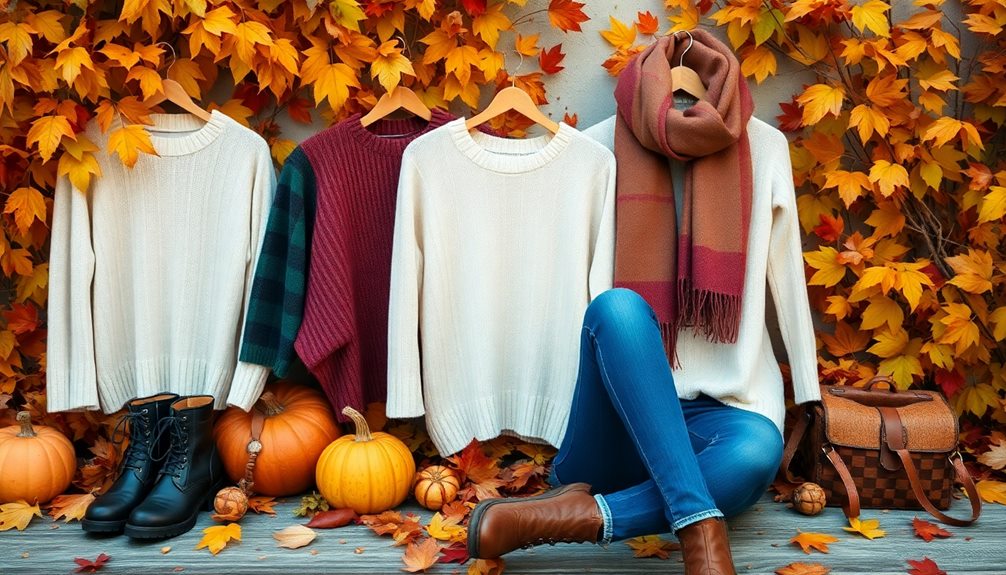
As the leaves change and temperatures drop, your fall wardrobe should embrace both comfort and sustainability. To build a collection that's stylish and eco-friendly, focus on these essential pieces:
- Cozy Sweaters – Opt for those made from sustainable materials like organic cotton or recycled fibers. They're perfect for layering and staying warm.
- Layering Jackets – A classic puffer jacket is a timeless staple that offers versatility and warmth, ensuring you look chic while staying cozy.
- Sustainable Denim – Invest in ethically produced denim that complements your cohesive color palette of earthy tones, making it easy to mix and match.
- Practical Accessories – Incorporate oversized totes and knitted scarves, which add functionality and style to your fall fashion.
Building Your Sustainable Wardrobe
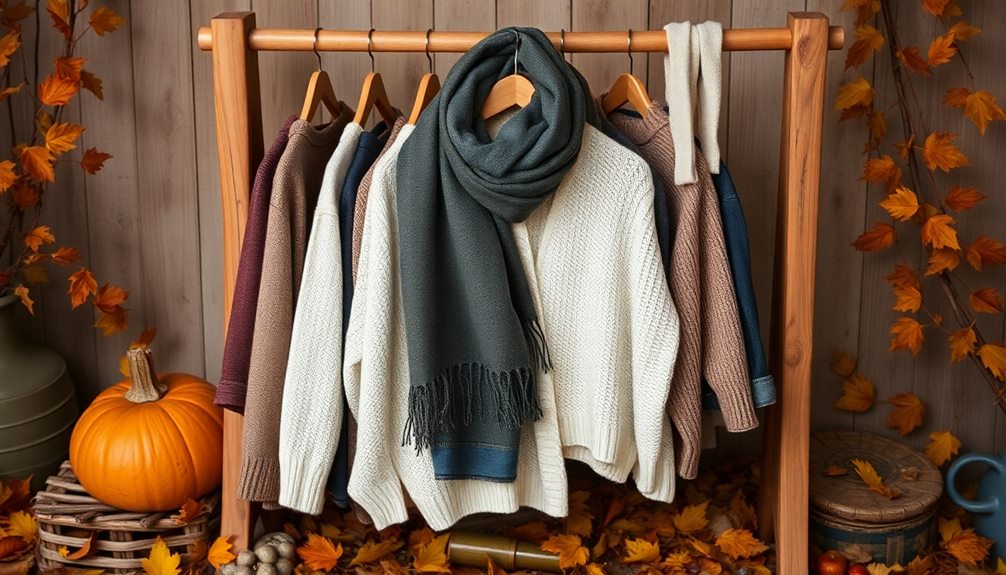
When building your sustainable wardrobe, focus on creating a capsule collection filled with timeless fashion staples that you can mix and match.
Implementing vertical storage solutions can help keep your wardrobe organized and accessible.
Choosing pieces made from sustainable fabrics guarantees your style choices are both eco-friendly and stylish.
Capsule Wardrobe Benefits
Creating a capsule wardrobe offers numerous benefits that can transform your approach to fashion. By focusing on a limited selection of sustainable clothes, you can streamline your wardrobe and make more conscious choices. Here are some key advantages:
- Versatile Mixing and Matching: With up to 12 curated items, you can create countless outfits using timeless pieces, making dressing easier and more enjoyable.
- Minimize Fashion Waste: By prioritizing quality over quantity, you'll reduce your environmental impact and promote sustainable practices. This approach encourages you to choose clothing designs that last.
- Support Ethical Brands: A capsule wardrobe often leads to supporting sustainable brands with ethical supply chains, ensuring your clothing is made from organic fabrics and produced responsibly.
- Reduce Decision Fatigue: Simplifying your choices can save you time—up to 15 minutes a day! This means less stress and more focus on what truly matters.
Building a capsule wardrobe not only enhances your personal style but also aligns with your values, allowing you to make informed fashion decisions that benefit both you and the planet.
Timeless Fashion Staples
In a world where fast fashion dominates, investing in timeless fashion staples is key to building a sustainable wardrobe. These versatile pieces, like boyfriend jeans or long sleeve dresses, enhance wardrobe longevity and reduce the need for frequent purchases. By choosing classic styles, such as organic cotton leggings or crew sweaters, you guarantee your selections remain in fashion across seasons.
Sustainable brands create timeless staples from eco-friendly materials, aligning with ethical production practices that benefit the environment. When you incorporate functional pieces equipped with pockets and layering potential, you add practicality to your wardrobe while encouraging mindful consumption. This approach emphasizes quality over quantity, allowing you to invest in fewer, high-quality items.
Moreover, focusing on a cohesive color palette with neutral tones and earthy accents simplifies your daily dressing routine. This strategy not only enhances versatility in outfit combinations but also minimizes fashion waste, contributing to a more sustainable lifestyle.
Sustainable Fabric Choices
Choosing sustainable fabrics is essential for building an eco-friendly wardrobe that aligns with your values. By prioritizing these materials, you contribute to eco-friendly practices and reduce your environmental footprint.
Additionally, embracing mindful choices in your clothing selections can lead to mental and emotional benefits that promote a sense of calm and well-being.
Here are four sustainable fabric choices to contemplate:
- Organic Cotton: Grown without harmful pesticides, it uses less water and promotes healthier soil.
- Recycled Polyester: This fabric diverts waste from landfills and minimizes reliance on petroleum resources, supporting a circular economy.
- Low-Impact Dyes: Using these dyes reduces water pollution and chemical runoff, making your clothing safer for the environment and yourself.
- Biodegradable Materials: Fabrics like hemp and organic linen decompose naturally, ensuring your garments leave a minimal impact at their end of life.
The Impact of Ethical Choices

Ethical choices in fashion can dramatically shift the industry's environmental and social landscape. By choosing to support ethical brands that prioritize sustainable materials, like recycled and organic fabrics, you help combat the detrimental effects of the fast fashion industry, which accounts for about 10% of global carbon emissions. Your purchasing power can push companies to adopt certified, responsible production methods that respect both people and the planet.
Supporting these ethical brands not only reduces waste and pollution but also promotes social justice through fair labor practices. By ensuring living wages and safe working conditions for garment workers, you contribute to a more equitable supply chain. This conscious decision-making fosters awareness of labor rights issues, inspiring others to follow suit.
Additionally, many ethical brands offer donation programs, allowing you to recycle your clothing responsibly while supporting various causes. By making informed fashion choices, you're not just dressing sustainably; you're actively participating in a movement that prioritizes the well-being of both the environment and society.
Your choices matter, and together, we can create a positive impact against climate change and the exploitation found in the fast fashion industry.
Frequently Asked Questions
How Can I Identify Truly Sustainable Brands?
To identify truly sustainable brands, you'll want to research their practices, materials, and certifications. Check for transparency in sourcing, production methods, and labor conditions. Look for third-party certifications that verify their commitment to sustainability.
Are Sustainable Clothes More Expensive Than Fast Fashion?
Yes, sustainable clothes often cost more than fast fashion. This's due to higher quality materials and ethical production methods. However, investing in sustainability means supporting environmentally friendly practices and ensuring better longevity for your wardrobe.
Can I Find Sustainable Options for Plus-Size Clothing?
Did you know that nearly 68% of plus-size shoppers struggle to find stylish options? You can definitely find sustainable plus-size clothing brands that cater to your needs, combining style and eco-friendliness for a perfect fit!
How Should I Care for Sustainable Fabrics?
To care for sustainable fabrics, wash them in cold water and use a gentle detergent. Air dry whenever possible to maintain their integrity. Avoid harsh chemicals and high heat to prolong their lifespan and reduce environmental impact.
What Are the Best Materials for Sustainable Fall Clothing?
When you think of cozy fall clothes, consider materials like organic cotton, Tencel, and recycled wool. They're not just soft; they're also friendly to the planet, making your wardrobe both stylish and sustainable.
Conclusion
As you build your sustainable fall wardrobe, remember that your choices matter. Did you know that the fashion industry is responsible for about 10% of global carbon emissions? By opting for eco-friendly brands and essential pieces, you're not just looking good; you're making a positive impact on the planet. Embracing sustainable fashion isn't just a trend; it's a lifestyle that promotes both style and environmental responsibility. Let your wardrobe reflect your values this season!
